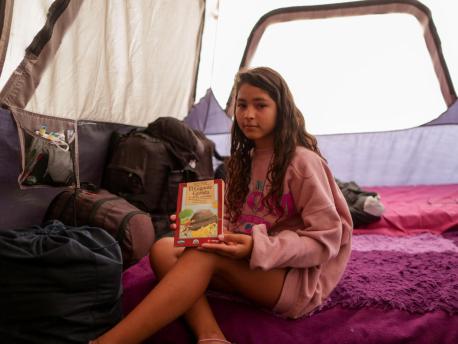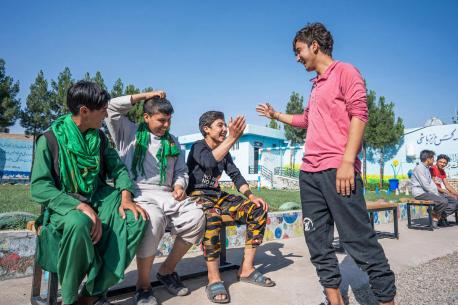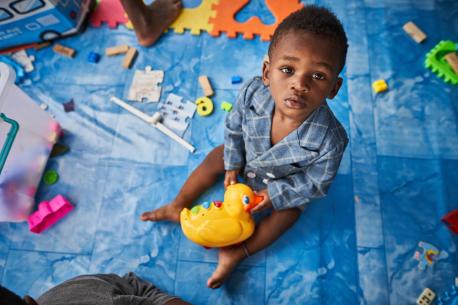
Migrant and Refugee Children Need Help Urgently
UPDATE, 11/29/18:
UNICEF is deeply concerned for the safety and well-being of the more than 1,000 migrant children moving through Mexico or waiting at the border in Tijuana for their asylum claims to be heard by immigration authorities in the U.S.
Protecting children from violence and preserving their rights must be a priority for all governments. The use of tear gas on migrant families at the Mexico border on Nov. 25 has "the potential to have a dangerous and long-lasting effect on children," according to CNN.
The American Academy of Pediatrics issued a statement condemning the practice: "Images and news reports of tear gas being used on children and families seeking asylum at our border have stunned and shaken pediatricians just as they have so many others across the country.... The use of tear gas on children — including infants and toddlers in diapers — goes against evidence-based recommendations, and threatens their short and long-term health."
Protecting children from violence and preserving their rights must be a priority for all governments
UNICEF is installing a Child Services Pavilion in Tijuana to ensure that children and families have safe drinking water, hand-washing and sanitation facilities and hygiene supplies. UNICEF has also set up Child-Friendly Spaces where children can play safely and receive psychosocial support.
UNICEF urges governments in the region to keep families together and to use proven alternatives to immigration detention, such as community-based case management for families. Detention and family separation are deeply traumatic experiences that can leave children more vulnerable to exploitation, abuse and trafficking.
Families only leave home when they have to, in search of safety and a better life
On October 13, a group of 160 people set out from San Pedro Sula, Honduras, joining the tens of thousands of Central Americans who leave home every year, fleeing gang violence, extortion, poverty and lack of opportunity. As they moved northward, other groups from Guatemala and El Salvador merged with the migrant caravan, swelling its ranks and capturing the world's attention.
By early November, nearly 10,000 people had crossed into Mexico from Central America, including at least 2,300 children. The long and arduous journey left children dehydrated, exhausted and exposed in inclement weather, including dangerously hot temperatures, without a roof over their heads or even a blanket to cover themselves.

UNICEF is on the ground in Central America and Mexico, helping the children traveling with the migrant caravan. © UNICEF Mexico
Children traveling with the caravan need protection and assistance
UNICEF is there to help.
A child is a child. Migrant and refugee children urgently need protection, clean water, health care, shelter and adequate sanitation. In Mexico, UNICEF is working with the government and other partners to ensure that uprooted children are provided with the help and services they need and that their rights are upheld.
Together with partners, @unicefmexico is providing children and families in the #MigrantCaravan with safe drinking water, hygiene and sanitation packs, rehydration salts, sunscreen and soap.#AChildIsAChild first and foremost, regardless of their migration status. pic.twitter.com/BFAcJBb7eH
— UNICEF (@UNICEF) October 27, 2018
UNICEF is on the ground, standing up for migrant children
UNICEF is setting up drinking-water facilities in areas where members of the caravan are spending the night and starting distribution of oral rehydration salts, family hygiene and sanitation kits, soap and sunscreen, and working to install separate latrine and shower facilities for children and adults. Throughout northern Central American and Mexico, UNICEF is coordinating with civil society partners to provide counseling for children and families who have endured violence, exploitation and abuse at different stages of their journey.
Top photo: A Guatemalan father and his daugher arrive with dozens of women, men and children at a bus station following release from Customs and Border Protection in McAllen, Texas. © Spencer Platt/Getty Images
HOW TO HELP
There are many ways to make a difference
War, famine, poverty, natural disasters — threats to the world's children keep coming. But UNICEF won't stop working to keep children healthy and safe.
UNICEF works in over 190 countries and territories — more places than any other children's organization. UNICEF has the world's largest humanitarian warehouse and, when disaster strikes, can get supplies almost anywhere within 72 hours. Constantly innovating, always advocating for a better world for children, UNICEF works to ensure that every child can grow up healthy, educated, protected and respected.
Would you like to help give all children the opportunity to reach their full potential? There are many ways to get involved.





